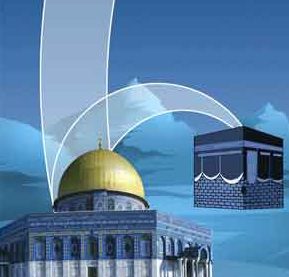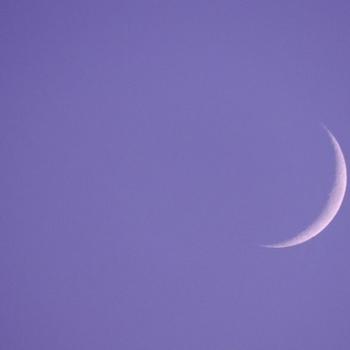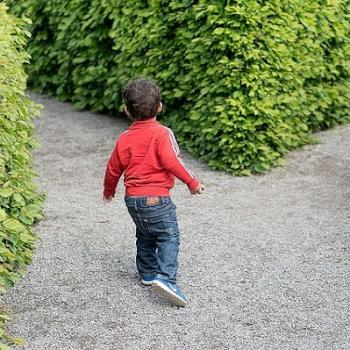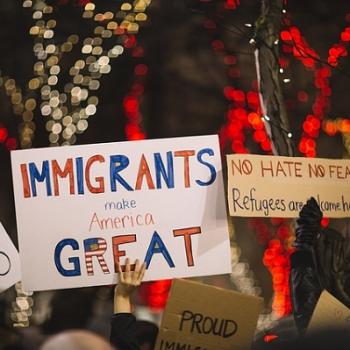 How are your Ramadan preps coming along? In less than 40 days, the holy month of Ramadan will be upon us, and the months preceding it—Rajab and Sha’baan – are great months to prepare, make up fasts, get into the right frame of mind, set our goals, to evaluate where we are now in our deen from last Ramadan and figure out where we want to be with this Ramadan and after.
How are your Ramadan preps coming along? In less than 40 days, the holy month of Ramadan will be upon us, and the months preceding it—Rajab and Sha’baan – are great months to prepare, make up fasts, get into the right frame of mind, set our goals, to evaluate where we are now in our deen from last Ramadan and figure out where we want to be with this Ramadan and after.
Near the end of the month of Rajab also comes the significant event from Islamic history known as Isra and Miraj, or the journey of the ascension of the Prophet Muhammad (saw). As the story goes, this was when the Prophet Muhammad (saw) was visited by the Angel Jibriel (Gabriel) and two other angels, who prepared his body for a special journey. Soon after, a creature known as the Barraq, which hadith says resembles a horse-like animal, arrived to take the Prophet on a special journey.
It’s interesting, as noted by Islamic Voice, that the word Barraq has an interesting meaning:
“After the transformation of the body, a conveyance named Burraq was presented before him. Burraq, the narration says, resembled a horse-like animal but its very name indicates that it also possessed a lightening body. The word Burraq is derived from the root Bar’q which means ‘electricity’ in Arabic. Burraq signifies that he had to be taken with the velocity of Bar’q that is electricity or light which is 300,000 km per second.”
The Barraq, as the story goes, then carried the Prophet from Makkah to Masjid-al-Aqsa in modern-day Jerusalem, which is indicated in the Quran: “Exalted is He (Allah) who took his bondsman (Muhammad) for a journey by night from Masjid-il-Haram (Ka’ba) to Masjid-il-Aqsa (the Mosque in Jerusalem), the neighborhood whereof we have blessed, in order that we might show him our signs … (17:1)”
There at Al Aqsa, the Prophet led in prayer all prophets who were gathered there, and from there he was raised to the heavens where he met with different Prophets. Says Islamic Voice:
“Then came the most honoured moment of the journey as he was elevated to a point beyond heavens, called Sidrat-ul-Muntaha. What he observed there is described in Quran in the following words; ‘One free from any defect in body and mind then He rose and became stable, While he was in the highest part of the horizon. Then he approached and came closer and was at a distance of two bows length or (even) closer. So, He (Allah) revealed to his bondsman (Muhammad) whatever he revealed. The Prophet’s heart lied not in what he saw. Will you then dispute with him (Muhammad) about what he saw? And indeed, he (Muhammad) saw him at a second descent near Sidrat-ul-Muntaha. Near it is Paradise of Abode. When that covered the Sidrah, which did cover it, the sight (of Prophet Muhammad) turned not aside nor it transgressed beyond the limit. Indeed he (Muhammad) did see of the greatest signs of his Lord (Allah). (53:6-18)’”
As the last part of the story of this wondrous night goes, the rule that Muslims must perform salaat (prayer) five times a day was ordained. And when it was all done, he was taken back to Makkah to the Ka’ba, with the whole journey being completed within the night.
I’ve been told this story of Isra wal Meraj from as long as I can remember by my parents. Growing up in North Dakota in the 1980s where we were one of the only Muslim families in town – no Sunday Schools let alone Islamic schools, no plethora of great Islamic children’s books or historical textbooks readily available to us for learning (forget Internet and Google) – our Islamic knowledge came from the oral storytelling of our faith from my parents.
Why should we remember Isra wal Miraj? It isn’t required for us as Muslims to pray extra in remembrance of this important moment from our faith. We don’t need to “celebrate” it as we do our two Eid holidays, nor are we asked to fast or do anything in particular. But there is so much that is beautiful and interesting about this story, starting with the miracle that was this whole night journey to learning that this was when five daily prayers became incumbent upon Muslims.
I was driving my kids to “Special Needs Night” at Jumpology (a trampoline jumping place) yesterday when I asked them to listen up as I told them the story of Isra wal Meraj. Car rides, when they are trapped in small space with me is when I often have them recite the Quranic surahs and verses that they know, teach them new ones, and tell them stories of significant events in Islamic history.
But more than just the story, I want them to know why it’s important to remember. As it says in this post from the Celebrate Mercy blog:
“The journey of Isra wal Miraj was a miraculous journey in [the Prophet Muhammad (saw)] life that not only brought enormous amounts of blessings to him but also to us. This journey was God Almighty’s wonderful response to the Prophet’s (pbuh) sad state in the year which is commonly known as “The year of great sadness.” This was a particularly sad time for Muhammad (pbuh) as his beloved wife Khadija (RA), who was his strongest supporter had passed away. Soon after, his Uncle Abu Talib passed on and left him completely alone, with no protection against the fierce Tribe of Quraish in Mecca.
With no one by his side, his situation looked bleak as the small Muslim community was suffering persecution and were being exiled from their own city in Mecca. With no hope in sight, Muhammad (pbuh) decided to go on his own to the City of Taif to see if he would be able to get some support from the leaders there. To his dismay, it became the lowest point in his life. Upon making his request and inviting the people to Islam, not only was he rejected but he was disgraced and humiliated by their leaders and children who had brutally stoned him and left to bleed alone.”
At this low point, the Prophet Muhammad made a prayer to Allah (swt), saying that even if no one believes him, he remains steadfast in his faith and belief in Allah and hopes Allah will be pleased with him.
And soon after Prophet Muhammad was rewarded thusly:
“Two wonderful gifts of blessings were granted to our Prophet (pbuh) after this difficult test. A group of jinn became believers and embraced Islam and Allah granted Muhammad (pbuh) the Journey of Isra wal Miraj. After the most difficult time in his life had surpassed, the Prophet (pbuh) was rewarded with the Journey that no other human was ever granted or could ever imagine; and that was the journey to meet Allah Himself. Within that journey were miracles and blessings of meetings with past prophets of our time, being shown the seven heavens, having access to view the delights of Paradise and the perils of Hellfire. Muhammad was granted a VIP ticket into Allah’s most privately concealed truths. The Muslim Ummah (Nation) was granted the 5 prescribed prayers; the gift that keeps on giving and our one-way to Allah and His Divine Knowledge. Muhammad (pbuh) was granted access that no other had ever been granted before. Allah blessed him with His Divine blessings and rewards and reminded his servant that none of his suffering has been in vain.”
We’ll be Face timing with my Dad tonight, as I’ve asked him to tell the story of Isra wal Meraj and talk about what is so special about this part of our history to my kids, just like he did with my brothers and I when we were little.
A little post-Maghreb family time thanks to modern technology.











